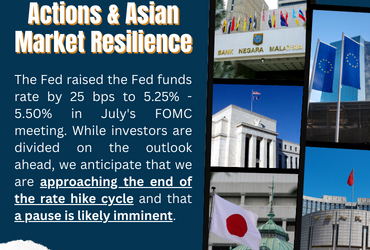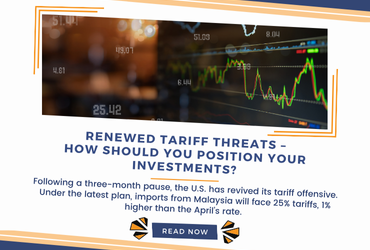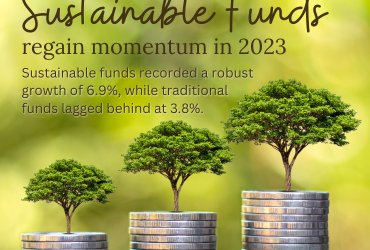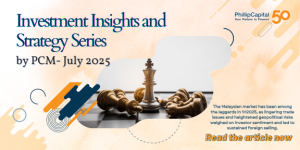
Market Review
In June, the MSCI Asia Pacific Ex-Japan Index (+5.3% month-on-month (m-o-m)) outperformed the MSCI World Index (+4.2%m-o-m), owed largely to South Korea’s (+13.9%) exceptionalism as its exports rebounded on strong tech demand. Taiwan (+4.3%) was also a winner of the tech revival, as its exports to the US exceeded those to China. Hong Kong (+3.4%) was also up on favorable exports, with news reporting elevated front-loading of shipments as businesses scrambled to beat the July US tariff deadline. At the opposite end of the spectrum, Thailand (-5.2%) struggled to regain its footing, extending losses to -22.2% year-to-date as conditions exacerbated following a political breakup. Indonesia (-3.5%) pulled back after a 2-month rally, as US tariff troubles loomed over its economy, prompting its government to ease import rules ahead of the July deadline (see Exhibit 1).
Exhibit 1: Market Performance June 2025
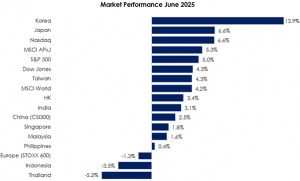
Source: Bloomberg, PCM, 30 June 2025
On the monetary policy front, in June, the Federal Reserve (Fed) held interest rates steady at the 4.25% to 4.50% range during its meeting, as widely expected. Separately, the European Central Bank (ECB) cut interest rates by 25 basis points to 2.00%. The Bank of England (BoE) kept interest rates at 4.25%. In Asia, the People’s Bank of China (PBoC) maintained the one-year LPR at 3.0% and the five-year LPR at 3.5%. The Bank of Japan left its key short-term interest rate unchanged at 0.5% during its June meeting. Finally, the Reserve Bank of India (RBI) cut its key repo rate by 50 basis points to 5.50%.
The FBMKLCI Index gained 1.6% m-o-m in June, closing at 1,532.96 points. Meanwhile, the Small Cap Index declined by 0.9%, while the Mid 70 Index increased by 1.2%. Sector-wise in June, the top-performing sectors were Utilities, Energy, and Technology, up 4.3%, 3.9%, and 3.4%, m-o-m, respectively. The worst-performing sectors were Healthcare, Financials, and Property which saw declines of 5.4%, 1.1% and 0.4%, m-o-m, respectively. Foreign investors turned net sellers in June, recording RM1.3 billion in outflows. Separately, in June, there were two listings on the Main Market (Paradigm Real Estate Investment Trust and Cuckoo International (Mal) Bhd), four listings on the ACE Market (ICT Zone Asia Bhd, Signature Alliance Group Bhd, Hartanah Kenyalang Bhd, and Pan Merchant Bhd), and two listings on the LEAP Market (Ping Edge Technology Bhd and Myaxis Group Bhd).
Equity Market Outlook & Investment Strategy
Malaysia
The Malaysian market has been among the laggards in 1H2025, as lingering trade issues and heightened geopolitical risks weighed on investor sentiment and led to sustained foreign selling. We expect the Malaysian market to adopt a wait-and-see stance in 2H2025 as it digests the impact of a tariff-driven global slowdown, alongside domestic cost pressures from higher SST, RON95 fuel prices, and electricity tariffs. Despite these headwinds, strong domestic liquidity, attractive below-mean valuations, and supportive government initiatives—such as NETR, JS-SEZ, and NIMP 2030—could help cushion downside risks and support selective buying opportunities in the near term.
Regional
Global markets broadly rebounded in May and June, supported by a 90-day pause on key U.S. tariffs. By late June, only one formal trade deal—between the U.S. and U.K.—had been finalized. While U.S.-China tensions have eased slightly, we believe the overall trade environment remains uncertain, with geopolitical risks in the Middle East flaring up on and off, keeping investors cautious. Separately, on the monetary policy front, major central banks have shifted toward easing in response to softer growth and moderating inflation, though the U.S. Federal Reserve remains an exception, holding rates steady due to concerns over tariff-driven inflation. Although the Fed has maintained its projection for potential rate cuts this year, we believe it would not be surprising if rates remain elevated for longer in order to contain renewed inflationary pressures, given the continued strength of the economy and labor market. Against this backdrop, we emphasize the importance of diversification and a focus on quality amid volatility.
Fixed Income Outlook & Strategy
Malaysia
In the near term, UST yields are likely to remain volatile, with a slight downward bias amid growing recession concerns and persistent expectations of Fed rate cuts later this year. Softer economic data, weakening business confidence, and dovish Fed commentary have reinforced the case for policy easing. However, upside risks to yields persist, particularly from potential fiscal expansion under Trump’s proposed spending plan, renewed US-EU trade tensions, and any upside surprises in labor market or inflation data. Markets will closely watch upcoming non-farm payrolls, CPI, and fiscal policy developments, which could recalibrate rate expectations and influence yield direction.
Domestically, Malaysian Government Securities (MGS) and Government Investment Issues (GII) yields are expected to stay stable, supported by resilient demand, a favorable supply-demand backdrop, and potential capital reallocation from developed to emerging markets.
Regional
UST yields in June 2025 were highly volatile, reflecting growing uncertainty around the US economic outlook and global risk sentiment. Yields declined early in the month as weak ADP employment data and softer services activity strengthened market expectations for earlier Fed rate cuts. However, mid-month saw a temporary uptick in yields amid renewed geopolitical tensions, persistent concerns over US fiscal health, and signs of foreign selling in Treasuries. Toward month-end, yields fell sharply, particularly on the short end of the curve, as falling oil prices, soft consumer and business sentiment data, and dovish signals from Fed officials deepened recession fears. The 2-year yield dropped to 3.72%, while the 10-year yield eased to 4.24%.
The bank of Japan kept its key short-term interest rate unchanged at 0.5% during its June meeting, maintaining the highest level since 2008 and aligning with market expectations. The unanimous decision underscored the central bank’s cautious stance amid escalating geopolitical risks and lingering uncertainty over U.S. tariff policies, both of which continue to pose threats to global economic growth.
The June 2025 BOJ Tankan survey showed improved sentiment among large Japanese manufacturers, with the index rising to +13—its highest since December—driven by robust capital expenditure plans, which are expected to grow by 11.5% in FY2025. However, optimism was tempered by concerns over declining profits (projected -8.4%) and weak export sales (+0.6%) amid growing uncertainty from US tariff policies. Sentiment among large non-manufacturers slipped slightly to +34 due to rising labor costs and softer tourism demand. Overall business sentiment across all firm sizes remained steady at +15, while inflation expectations stayed anchored around 2.4%, indicating continued cost pressures but stable medium-term price outlooks
Strategy for the month
We remain neutral on global equities, as policy-driven uncertainty under US President Donald Trump continues to weigh on investors sentiments. However, we remain constructive on Asia Pacific ex-Japan equities, particularly in North Asia, supported by a weaker US dollar and a more dovish Federal Reserve. Potential easing by the Fed would give Asian central banks greater flexibility to lower interest rates, which in turn could provide further support to regional market sentiment.
We continue to prefer Malaysia, as it remains a laggard this year compared to other markets. While the MSCI Asia Pacific ex-Japan Index is now trading at 52-week highs amid renewed optimism, and both the U.S. and European markets are performing well, we see value in positioning in laggards like Malaysia that have yet to catch up. We maintain a neutral view on large-cap stocks due to balanced risk-reward and have shifted to bullish on small-caps as the recent market correction has created selective buying opportunities.
Sector-wise for the next six months, we are bullish on the Utilities and Construction sectors, supported by strong policy tailwinds and rising investment momentum. Key initiatives such as the New Industrial Master Plan 2030, the National Semiconductor Strategy, and the Johor-Singapore Special Economic Zone are expected to spur infrastructure development and energy demand. In addition, the upcoming National Investment Incentives Framework and the next phase of multi-pronged reforms under the 13th Malaysia Plan will further reinforce investment flows. For Construction, we see positive spillovers from rising capex in infrastructure, industrial parks, and data centre developments. Meanwhile, the Utilities sector is well-positioned to benefit from structural demand growth driven by the National Energy Transition Roadmap (NETR) and the accelerating shift towards clean and sustainable energy.
For Financials, the recent OPR cut may result in a 1–2% impact on overall earnings, as net interest margins (NIMs) are expected to temporarily compress. However, NIMs should begin to normalise in the coming quarter as the downward repricing of deposit rates takes effect. That said, the sector remains supported by attractive dividend yields and continued interest from institutional investors. We maintain an underweight view on the Energy sector due to its cyclical nature, which makes earnings more volatile. Nonetheless, energy companies with diversified business models are likely to be more resilient and less affected by these cyclical pressures.
Exhibit 2: PCM’s monthly strategy snapshot
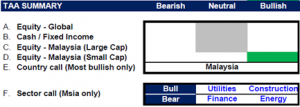
Source: PCM, 30 June 2025
Phillip Capital Malaysia and our offerings
We reaffirm our belief that there are still opportunities in the market, and we maintain a discerning approach in choosing high-quality stocks for our portfolio. However, it is crucial to exercise caution and carefully select investment options to ensure the best risk-adjusted returns. By taking a vigilant and discerning approach, investors can potentially reap the benefits of the current market opportunities while minimising risks.
A noteworthy avenue for investors seeking diversification in their portfolio is through PhillipCapital Malaysia. PhillipCapital Malaysia offers multiple private mandate services managed by professional fund managers. By leveraging PhillipCapital Malaysia’s private mandate services, investors can enhance their resiliency, optimise portfolio performance, and navigate the complexities of the market with confidence.
We also offer both conventional and Shariah-compliant options to cater to the needs of all investors. For Malaysia’s mandates, we like:
- PMART/PMA Dividend Enhanced and/or PMART/PMA Dividend Enhanced ESG
Our PMART Dividend Enhanced and PMA Dividend Enhanced is an income-driven portfolio focused on high dividend-yielding equities. We apply the Dog of the Dow approach, screen and select top market cap stocks to minimise risk and ensure consistent performance. The portfolio is an equal weighting portfolio which reduces concentration risk and provides similar exposure to all clients, both initially and after rebalancing. We offer both conventional and Shariah investment options to cater to the diverse needs of our investors. Click here to learn more. We recently also introduced PMART/PMA Dividend Enhanced ESG Mandate as we remain dedicated to investing in ESG stocks given their stronger valuation and profitability.
- PMART/PMA ESG
Phillip Capital Malaysia offers discretionary portfolio that invests in stocks with high ESG ratings from the F4GBM and F4GBMS Indices, namely PMART and PMA ESG. There are both conventional and Shariah options available. To explore the companies in which both Conventional and Shariah ESG mandates invest, you can refer to the provided link.
- PMART/PMA Blue Chip and Opportunity
Our Blue-Chip portfolios primarily allocate our investments towards companies with large market capitalisations, while the Opportunity portfolios predominantly invest in companies with smaller market capitalisations. We also offer both conventional and Shariah-compliant options to cater to the needs of all investors.
Please click on the link to learn more or email us at cse.my@phillipcapital.com.my if you require any further information.
Disclaimer
The information contained herein does not constitute an offer, invitation, or solicitation to invest in any product or service offered by Phillip Capital Management Sdn Bhd (“PCM”). No part of this document may be reproduced or circulated without prior written consent from PCM. This is not a unit trust or collective investment scheme and is not an obligation of, deposit in, or guaranteed by PCM. All investments carry risks, including the potential loss of principal.
Performance figures presented may reflect model portfolios and may differ from actual client accounts’ performance. Variations in individual clients’ portfolios against model portfolios and between one client’s portfolio to another can arise due to multiple factors, including (but not limited to) higher relative brokerage costs for smaller portfolios, timing of capital injections or withdrawals, timing of purchases and sales, and mandate change (e.g., Shariah vs. conventional). These differences may impact overall performance.
Past performance is not necessarily indicative of future returns. The value of investments may rise or fall, and returns are not guaranteed. PCM has not considered your investment objectives, financial situation, or particular needs. You are advised to consult a licensed financial adviser before making any investment decisions.
While all reasonable care has been taken to ensure the accuracy and completeness of the information contained herein, no representation or warranty is made, and no liability is accepted for any loss arising directly or indirectly from reliance on this material. This publication has not been reviewed by the Securities Commission Malaysia.




